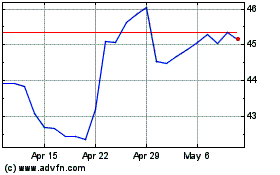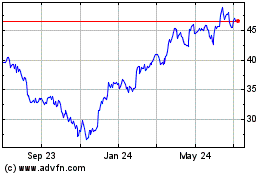By Taos Turner
BUENOS AIRES--President-elect Mauricio Macri has vowed to
transform Argentina's economy by curbing currency controls and
restoring investor confidence. But while business leaders here
welcome his plans, they say some policies, including a widely
expected devaluation, could be painful in the short term.
Topping the list of challenges facing Mr. Macri when he takes
office on Dec. 10 is a two-headed monster: 25% inflation and an
artificially strong currency that has made Argentine goods
uncompetitive abroad. Besides grappling with that, he will be
called upon to move quickly to stanch the bleeding of
foreign-currency reserves at Argentina's central bank, which
importers say owes them more than $9 billion for goods they have
brought into the country.
"We don't know how many dollars we're going to get," said Isela
Costantini, president of General Motors Co. in Argentina, Paraguay
and Uruguay. "It's not that I'm telling you that we don't know
what's going to happen in three months or in one year. We don't
know what's going to happen next week."
Earlier this week, American Airlines Group Inc. stopped
accepting Argentine pesos for tickets because currency controls
were affecting its ability to repatriate earnings.
The dearth of greenbacks affects companies big and small, and
has caused problems for imports of everything from automotive parts
and surgical gloves to screws and bolts needed to maintain
manufacturing equipment. It also hurts farmers.
"I import chemicals from China. I have to pay the Chinese and I
can't pay them because I can't get the dollars to do it. So this
creates a problem for me because if I can't import, I have to close
my factory," said Gustavo Grobocopatel, chief executive of Grupo
Los Grobo, one of Argentina's biggest agribusiness firms.
Departing President Cristina Kirchner imposed the
foreign-exchange controls in 2011, seeking to contain rising demand
for dollars. But the move had the opposite effect. Since then the
central bank's official reserves have plummeted to below $26
billion from $52 billion--and many local economists say the bank's
net balance is negative.
"We don't know how many reserves there are," Mr. Macri said
Monday, adding that Argentina's economic statistics are so
unreliable that his economic team will have to take office and
evaluate the situation before announcing policy initiatives.
Mr. Macri has called for the resignation of Central Bank
President Alejandro Vanoli, who is under investigation for
allegations that he directed the bank to illegally sell dollar
derivatives at a low exchange rate, potentially costing the central
bank billions of dollars. Mr. Vanoli, who has accused Mr. Macri of
planning a devaluation, denies wrongdoing and says the bank was
acting to defend the value of the peso.
Former government officials and economists warn that currency
controls are difficult to dismantle, and that doing so abruptly
could lead Argentines to ditch their pesos en masse, making it even
harder for the central bank to oversee a smooth transition to a new
exchange-rate system.
Many Argentines have already been buying dollars to protect
their savings ahead of a possible devaluation. Others have stocked
up on cars, televisions and other goods before prices rise.
"I came to the shopping center today to buy a cellphone because
I was told prices would rise," said Juliana Levy, 38, a ballet
dancer. "I don't think Macri will devalue abruptly. In any case, in
Argentina we're used to devaluations."
Argentina has a largely fixed official exchange rate, which is
now 9.68 pesos to the dollar. But since the government doesn't have
enough dollars to meet demand, people have turned to a thriving
black market, where dollars currently sell for around 15 pesos.
Mr. Macri has said those diverging rates could eventually
converge if the government let the fixed rate slide, but he has
provided few details about when this might happen. And he has said
he would be a Nobel Prize winner in economics if he knew exactly
what that rate would be.
"There is a significant amount of money outside of Argentina
from Argentines who are waiting for a more benign economic
environment. So I suspect the pain will be short-lived," said Jorge
Mariscal, chief investment officer for emerging markets at UBS
Wealth Management, which manages $1 trillion in assets.
Observers say Mr. Macri will also have to reduce costly gas and
electricity subsidies to narrow a rapidly rising budget gap. But
that could hit poor people hard if they are not targeted
exclusively to middle and upper-income households.
"One of the things Argentina has learned in recent years is that
it has to change things in ways that don't leave people behind.
Otherwise, the changes will be unsustainable," said Mr.
Grobocopatel.
Mr. Grobocopatel, known here as the "soybean king" because of
his agricultural production, estimates that exporters are hoarding
between $6 billion and $10 billion worth of soybeans and other food
products. Dollar inflows could rise significantly if Mr. Macri cuts
a 35% export tax on soybean exports and fixes the exchange-rate
system.
Mr. Macri is also hoping to obtain fresh funding from
international banks which are already negotiating a multibillion
package of loans to the country, according to a person familiar
with the matter.
Alberto Messer contributed to this article.
(END) Dow Jones Newswires
November 25, 2015 17:07 ET (22:07 GMT)
Copyright (c) 2015 Dow Jones & Company, Inc.
General Motors (NYSE:GM)
Historical Stock Chart
From Mar 2024 to Apr 2024

General Motors (NYSE:GM)
Historical Stock Chart
From Apr 2023 to Apr 2024
